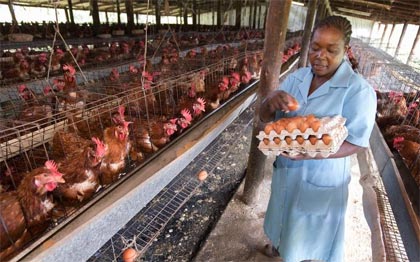Freshman Agatha Muagura whispers to the plump white chicken she is cradling in her arms. The bird is remarkably docile after being chased down, swung around by its feet and shoved on top of a scale for weighing.
Next lesson for Muagura — slaughtering and pulling out the innards. Next step for the chicken — Africa University dining hall.
Even though it is the end of the road for the chicken, really, until today, that chicken had a happy life.
On the more than 80-hectare (nearly 200 acres) Africa University farm, the chickens are content, the pigs and cows are fat and the crops are tall and bountiful.
Muagura, a first-year student from Mozambique, is one of eight students learning about farm work from Larry Kies, a United Methodist missionary with the denomination's Board of Global Ministries, who has been an adviser and instructor to the farm since 2002.
The Department of Agriculture and Natural Resources was established in 1992 as one of the first two faculties at this private, United Methodist-related institution. The farm provides chicken, beef and pork, eggs, dairy products and a wide range of vegetables to feed the students and staff. Leftovers are sold to restaurants and hotels in Mutare.
 |
| Naomie Chikosi gathers eggs at the Africa University farm in Mutare, Zimbabwe. Photo by Mike DuBose, UMNS. |
Naomie Chikosi is the manager of one of the hen houses. She quietly walks between the wire cages dozens of times a day plucking eggs from the 3,000 laying hens. She sweeps and cleans the shed and waters and feeds her feathery brood. She fills crates with 50 eggs, 70 crates a day, 365 days a year.
She loves her job. Gazing at the wire cages, shyly, she says, "They are happy, hear them cooing. I just like them so much."
Across from the chicken houses are three sheds of pigs. One for the general population, one for breeding and one for a maternity ward where baby pigs run around the feet of their moms.
The staff keeps an eye on the female pigs who are receptive to breeding one or two days in a 21-day cycle. The male to female ratio is about one to 30, Mupofu says. In between their duties, the big males nap.
The university also has goats and sheep.
The farm grows everything from onions and leafy vegetables to potatoes and walls of maize. "We are known for our potatoes," Mupofu says.
It's not just the Africa University students who learn farming techniques here. The teaching farm is open to the community and other universities.
Mupofu's office is in the first building constructed on the Africa University campus, a small round hut. He keeps the sparse office neat and clean.
"This is where the university started," he says with some pride. "We have 38 people on our staff, I am number 38."
excerpt from a story by Kathy Gilbert, multimedia news reporter for United Methodist News Service.
One of seven apportioned giving opportunities of The United Methodist Church, the Africa University Fund transforms Africa by educating and empowering students from across the continent through Africa University, the first fully accredited, United Methodist-related educational institution on the continent. The Africa University Fund supports the general operating expenses of Africa University including faculty and staff salaries and vital infrastructure. Please encourage your leaders and congregations to support the Africa University Fund at 100 percent.





